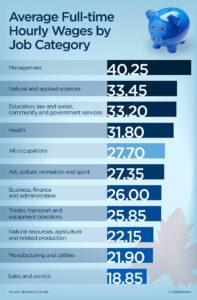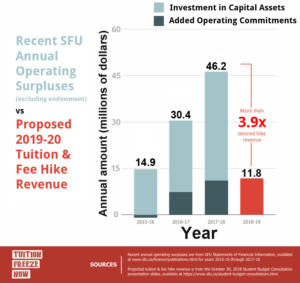Bust the Myth: the Logic of Inflation and Tuition Increases

By Jorji Temple, English PhD Student at Simon Fraser University
When we talk about freezing tuition, the question we get asked most often is “What about inflation?” This question, I think, explains a lot about our attitude toward education. Often, increasing tuition in line with inflation is presented as neutral, as “only fair,” or as the natural thing to do. Here’s why it’s not:
Student incomes are not tied to inflation. Neither in any SFU contracts with workers, nor across the economy, do raises equal or exceed inflation. This means that an increase in tuition that *is* tied to inflation is an ongoing *economic redistribution* from the students to the institution. Costs are handed down to students instead of being absorbed by the institution. If your income isn’t increasing at the rate of inflation, you’re losing purchasing power. Students, as a group, have *less* money each year, and tuition increases in line with inflation make that worse.

SOURCE: Global News and Statistics Canada
Also, student fees are not the primary source of funding for public universities like SFU. Check out any of SFU’s budgets, including the proposed one for next year, and you’ll see that tuition is only a small portion of the university’s funding.
I mention this because “inflation” arguments for tuition increases are premised on the idea that students are the university’s revenue source, and imply (or state) that without our financial contribution to the institution steadily increasing, the institution couldn’t function. This is simply untrue, as an examination of the last five years of budgets shows. This leaves aside how we got into the situation where universities weren’t funded properly (shoutout to Christy Clark and years of increasing Senior Admin salaries).

For only two quick examples, this year’s projected “budget deficit” could be recuperated by contributing a smaller amount to the endowment or altering building expansion plans. (If we had access to more of the proposed budget, we could offer other options for making up this deficit, but the Administration doesn’t share that information until later in the year). It also matters because each tuition increase shifts the university’s economic interests: do you want an educational institution whose decisions are based on advertising and student recruitment? One where the buildings are investments with student fees as the payoff?
The University has a choice here, whether to be an agent of dispossession or equality; whether to stand up for the students for whom it exists or to exploit them as customers because it can – restricting access to education in the process.
References:
https://globalnews.ca/news/3531614/average-hourly-wage-canada-stagnant/
https://www.huffingtonpost.ca/2017/02/23/wages-canada-low-end-jobs_n_14962214.html